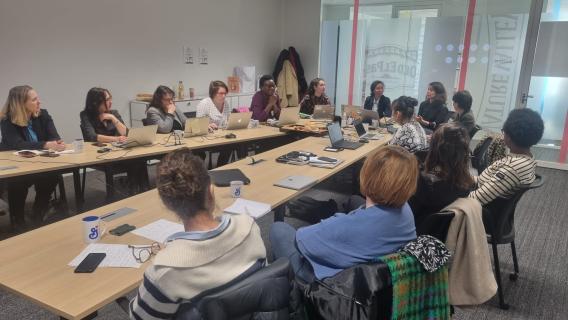SXSW 2016 : Intervention de Yann Bonnet
SXSW 2016, Austin, Texas - 15 mars 2016 French Tech Austin Meets French Tech over Breakfast
Intervention Yann Bonnet, French Digital Council, General Secretary
1 - French Digital Council
- France is usually seen as the land of freedom.
- Digital freedom do not only include freedom of speech but also includes freedom of entrepreneurship!
- And this is why the French Digital Council exists: to guarantee both.
- The French Digital Council (CNN) is an independent advisory commission.
- The board is composed of 30 members, all appointed by the French President and representing the digital ecosystem.
- He is composed of researchers, entrepreneurs, VCs, activists and representatives of the civil society.
- Our mission is to advise the French government on any questions related to the impact of digital technologies on economy and society.
- Most importantly, we play the role of an interface between the government and the digital ecosystem.
- in a word, we want to be the lobby of those who don’t have one -startups, citizens who don’t have the time, the money to assert their interests in front of public authorities.
2 - Vision of France and innovation
1)Public policies need to embrace the new paradigms of innovation.
Innovation is not only R&D. It shouldn’t be reduced to technological aspects. It’s so much more!
- There are :
- social innovation
- organisational innovation
- products, services, uses
- R&D (technological innovation)
- Business models innovation
- and merchandising innovation!
if you’re waiting for the next innovation cycle to begin, you’re already missing it. Innovation is already here. It’s everywhere (and not just in R&D laboratories!).
- This is why we’ve been pushing to adapt investment, financing measures and public intervention to this new paradigm.
2) In this international competition, France must rely on its many strengths and assets:
- France is a natural entry point to the European market and its 500 millions consumers.
- European market is like an Eldorado fort tech company
- European Consumers are educated, in health...
- For startups entrepreneurs, and business angels, France is a “tax haven”: we have several mechanisms that are very attractive :
- For innovative startups: we have a “young innovative company status” (JEI in French). Startups can employ high qualified talents and benefit from fiscal and social exemptions for 8 years.
- For any company, we have the “Credit Impôt Recherche”. It is a tax credit for companies which invest more than a certain pourcentage of their expenses in R&D.
- For investors and business angels, several tax credit mechanisms exists: for instance if you invest your money in VC funds with a very innovative portfolio, you will get credit on your income tax or your wealth tax.
The French tax system is complicated but is more than open to investors!
- France offers startups a real support, from installation to financing. I would say that the most efficient mesures a those which includes serveral types of actors: public actors, universities, private actors. France has a strong culture of business ecosystem, both locally and within industries.
French Tech Ticket
- The diversity of actors is very important for the vitality of an innovative ecosystem.
- This is why the City of Paris and the french gouvernment, have the ambition to make Paris a world capital for startups.
- few months ago, the governement laucnh the French Tech Ticket.
- It’s a program designed for non-french entrepreneurs from all over the world who want to create their startup in Paris.
The programm benefits -- for free you have:
- 6 to 12 months place in an incubator in paris
-
- Fast-track procedure to obtain a French residence permit.
- Prize money of €12,500, awarded to each founder, renewable once at the end of the 6 month program
- Tailored program of events and mentoring sessions to support your startup’s development.
Funding
- The biggest area we need to work is probably the funding.
- We need to redirect savings to French innovation, sartups.
- In United States, funding is 80% of capital and 20% debt.
- In France it is the opposite. We need to move forward on this.
3) The national consultation The French PM entrusted the Council with the challenging mission of leading a national consultation on digital issues.
- This consultation lasted 5 months (from October 2014 to February 2015). The goal was to collect recommendations and ideas to redesign France’s digital policies.
- This experiment was unique for several reasons:
-
- we chose to address a vast scope of subjects (from Human rights, to growth and innovation issues, to the digital transformation of the state).
-
- But I think it was unique, mostly because of its process: a public and transparent debate, largely opened to the public:
-
-
- To do so, we launched an online platform, allowing any citizen, public or private organisation to contribute to the consultation. We got around 20 000 contributions.
-
-
-
- We also organized 4 major meetings in different cities of France, asking innovators to come and pitch their ideas and initiatives.
-
-
-
- Lastly, we distributed an online kit (in a “do it yourself” approach), so that any wanting stakeholder could organize their own workshop on any part of the territory. More than 70 workshops were organized by universities, mayors of small towns, professional associations and even – this is a true story - a retirement home.
-
- A year later, we are pleased to note that most of the recommendations we issued are now being implemented:
-
- either into law (with the bill that is currently being discussed in Parliament)
- in the industrial strategy of the government,
- and some of these recommendations are being appraised by the European Commission – with which we have a useful dialogue.
4) Platforms fairness principle and the rating agencies We’ve been working a lot on platforms ecosystems. One of the important idea we expressed was the principle of platforms fairness. What do we mean?
- The formidable development of digital contents and services has been made possible by the open and contributory Internet. Yet, this original promise is challenged by growing power imbalances: between economic actors and disruptive organizations, between smaller services and major platforms, between Web giants and their users, etc.
- Dominant digital platforms must adopt a fair behaviour, regarding their clients and users, whether they are individuals or businesses >> Specific obligations are implied: transparency, obligation of information, and non-discrimination...
- In order to enforce this principle of fairness, we we strongly believe in a new form of regulation. In this innovative world, it is crucial that we adopt a disruptive approach:
-
- In a word, we need to open the monopoly of regulation to adopt a more flexible, and crowd-based regulation in order to complement and overcome some weaknesses of traditional tools.
-
- As the information economy grows, trust and reputation are becoming a bigger part of the equation. And when competition is - supposedly - just one click away, reputation becomes all the more important for online platforms.
- This is why the French Digital Council proposes the creation of a european “platforms rating agency”, to evaluate the behaviors of digital services:
-
- Those agencies would rely on an open network of contributors: a centralized agency relying on a decentralized crowd, a decentralized expertise really.
-
- It would offer a canal for information feedback, federating a wide variety of potential expertise: developers, designers, lawyers, consumers associations, and the communities of researchers.
-
- Those agencies would examine and rate specific aspects of the platforms, both in the BtoC and BtoB levels:
- comprehensiveness of the terms of service;
- detect some user interfaces crafted to trick people into doing things, such as signing up for recurring bills, disguised ads, forced disclosure, etc.
- stability of the APIs for developers;
- commercial behavior;
- but also, why not, harmful tax practices...
-
- Just like the current credit rating agencies, this agency’s role would be to clarify the choice for consumers, businesses (who want to develop an app within a platform), investors (who want to invest in an app developed within a platform), shareholders, public authorities...
This idea is getting more and more support (the Germans did it!) and the European commission is more and more interested.








